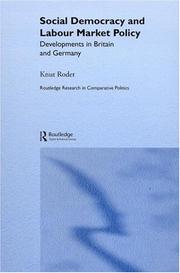| Listing 1 - 10 of 15 | << page >> |
Sort by
|
Book
ISBN: 9781400878369 1400878365 9780691623733 9780691051413 0691051410 0691623732 Year: 2015 Publisher: Princeton, NJ
Abstract | Keywords | Export | Availability | Bookmark
 Loading...
Loading...Choose an application
- Reference Manager
- EndNote
- RefWorks (Direct export to RefWorks)
During the years that the German Social Democratic party organization was legally suppressed by the Socialist Law, the movement underwent a fundamental transformation in its relationship to the traditions of political democracy and socialist theory with which it began in the 1860's. This history shows how, gradually adopting Marxian economic and political theory, the Party could not abandon parliamentary participation under the Socialist Law without closing its one open legal door. Thus the Social Democrats became both ambivalent parliamentarians and ambivalent revolutionaries.Originally published in 1966.The Princeton Legacy Library uses the latest print-on-demand technology to again make available previously out-of-print books from the distinguished backlist of Princeton University Press. These editions preserve the original texts of these important books while presenting them in durable paperback and hardcover editions. The goal of the Princeton Legacy Library is to vastly increase access to the rich scholarly heritage found in the thousands of books published by Princeton University Press since its founding in 1905.

ISBN: 9780739128435 0739128434 9780739132111 0739132113 1282479016 9786612479014 9781282479012 6612479019 Year: 2009 Publisher: Lanham, Md. : Lexington Books,
Abstract | Keywords | Export | Availability | Bookmark
 Loading...
Loading...Choose an application
- Reference Manager
- EndNote
- RefWorks (Direct export to RefWorks)
"The stories of the individual men and women who led German Social Democracy's failed efforts to fend off the Nazi onslaught in 1933 have largely been lost in the wake of the cataclysmic war, the Holocaust, and the division of Europe that followed Hitler's victory. Confronting Hitler recovers their stories and places them at center stage. In a series of biographical essays focusing on the experiences of ten leading Social Democratic activists, Smaldone examines their defeat in 1933 from the perspective of individuals enmeshed in political struggle."--Jacket

ISBN: 3486645633 3486703161 Year: 1991 Publisher: De Gruyter
Abstract | Keywords | Export | Availability | Bookmark
 Loading...
Loading...Choose an application
- Reference Manager
- EndNote
- RefWorks (Direct export to RefWorks)
1946 wurde auf Initiative Kurt Schumachers eine bis heute geheimnisumwitterte Organisation ins Leben gerufen, die für die Deutschlandpolitik der Sozialdemokratie bald eine zentrale Rolle spielen sollte: das Ostbüro der SPD. Zunächst zur Betreuung von Ostflüchtlingen gedacht, wurde das Ostbüro rasch für all jene eine Kontakt- und Anlaufstelle, die sich der Zwangsvereinigung von SPD und KPD zur SED widersetzten. Als Nachrichtenbörse für Informationen über die SED-Diktatur und die Stimmungslage in der SBZ/DDR und als Organ zur Verbreitung sozialdemokratischen Gedankenguts stand es gegen den Machtanspruch der Kommunisten im östlichen Teil Deutschlands. Auf der Grundlage bisher nicht zugänglicher Archivmaterialien und zahlreicher Interviews mit Zeitzeugen bietet Buschfort überraschende Einblicke in die Entwicklungsgeschichte, Arbeitsweise und Funktion des Ostbüros und die Politik seiner Akteure. Er erhellt damit einen von der zeitgeschichtlichen Forschung bisher nahezu ausgeklammerten Aspekt deutsch-deutscher Wirklichkeit in der Zeit des kalten Krieges.
Sozialdemokratische Partei Deutschlands. Ostburo --- -History --- Political party. --- Politics. --- Social democratic party of Germany. --- Government - Non-U.S. --- Law, Politics & Government --- Government - Europe --- Sozialdemokratische Partei Deutschlands. --- History. --- HISTORY / General.
Book
ISBN: 3486594761 3486559281 Year: 1992 Publisher: De Gruyter
Abstract | Keywords | Export | Availability | Bookmark
 Loading...
Loading...Choose an application
- Reference Manager
- EndNote
- RefWorks (Direct export to RefWorks)
Als 1917 in Russland ein Staatswesen errichtet wurde, das den Anspruch erhob, den Sozialismus zu verwirklichen, sah die deutsche Sozialdemokratie ihre Identität in Frage gestellt, war sie doch bis zum ersten Weltkrieg die führende Kraft der internationalen sozialistischen Arbeiterbewegung gewesen. Wie beurteilten die deutschen Sozialdemokraten das sowjetische Modell in seinen verschiedenen Phasen und wie wurden sie dadurch in ihrer politischen Entwicklung beeinflusst? Welche Rolle spielte die Sowjetunion in dem oft erbittert geführten Kampf mit den Kommunisten und welche Bedeutung hatte sie für die Abspaltung der USPD? Welche Haltung nahm die Sozialdemokratie außenpolitisch gegenüber der Sowjetunion ein? Inwieweit bestimmte die "ideologische" Gegnerschaft zur Sowjetunion ihre Außenpolitik? Jürgen Zarusky beschreibt anhand dieser zentralen Fragen, wie die deutsche Sozialdemokratie von der Oktoberrevolution bis zum Ende der Weimarer Republik sowohl in der ideologischen Auseinandersetzung als auch auf dem Gebiet der zwischenstaatlichen Beziehungen auf die "Herausforderung Sowjetunion" reagiert.
Socialism --- History. --- Sozialdemokratische Partei Deutschlands --- Germany --- Politics and government --- Weimar Republic, Germany, 1918-1933
Book
Publisher: FedOA - Federico II University Press
Abstract | Keywords | Export | Availability | Bookmark
 Loading...
Loading...Choose an application
- Reference Manager
- EndNote
- RefWorks (Direct export to RefWorks)
The book presents the correspondence between Roberto Michels and the Italian and French (Sorel and Lagardelle) syndicalists, which constitutes an essential historiographical source for the reconstruction of the controversial political biography of the sociologist. An introductory essay by Giorgio Volpe provides a critical interpretation of Michels' position within the socialist movement. It reconstructs the background of Michels' correspondences and studies the phases of his political militancy through the analysis of his political articles, sociological studies, autobiographical notes and reports on the Italian and German socialist parties' congresses.
Second International --- Syndicalism --- Socialism --- Partito socialista italiano --- Roberto Michels --- Sozialdemokratische Partei Deutschlands

ISBN: 3421017816 3486703471 Year: 1976 Publisher: De Gruyter
Abstract | Keywords | Export | Availability | Bookmark
 Loading...
Loading...Choose an application
- Reference Manager
- EndNote
- RefWorks (Direct export to RefWorks)
1891 als Sohn eines Reichstagsabgeordneten der Gründergeneration der SPD in Leipzig geboren, wuchs Curt Geyer in der Arbeiterbewegung auf. Nach dem Studium der Volkswirtschaft und Geschichte wurde er 1914 Redakteur an der Leipziger Volkszeitung, einer der wichtigsten sozialdemokratischen Tageszeitungen. Als Mitglied der USPD spielte Geyer in der Novemberrevolution eine führende Rolle im Leipziger Arbeiter- und Soldatenrat, im Dezember 1918 wurde er 27-jährig Fraktionsvorsitzender beim Berliner Rätekongress. Seine Karriere führte ihn in das Führungskollektiv der USPD, 1919-1924 war er Mitglied der Nationalversammlung und des Reichtags. Als Angehöriger der radikalen Linken propagierte er den Zusammenschluss der USPD mit der KPD und den Beitritt zur Kommunistischen Internationale. Anfang 1921 ging Geyer als Vertreter seiner Partei nach Moskau und machte dort die Erfahrung, dass in der Komintern nur Satelliten der russischen KP erwünscht waren. Geyer wandelte sich vom Propagandisten der Komintern zum Gegner des Moskauer Kurses; nach dem Ausschluss aus der VKPD kehrte er in die SPD zurück. Als Redakteur des Vorwärts und politischer Berater des Parteivorstands wandte er sich schließlich ganz vom orthodoxen Marxismus ab. Im Oktober 1933 musste Geyer Deutschland verlassen. In Prag und Paris war er Chefredakteur des Neuen Vorwärts und Mitglied des Exil-Parteivorstands der SPD. In London, der letzten Station seines Exils, trennte sich Geyer von der SPD. Von 1947 bis 1963 arbeitete er als Korrespondent der Süddeutschen Zeitung und einiger anderer Zeitungen in London. Er starb 1967 in Lugano.
Unabhangige Sozialdemokratische Partei Deutschlands --- USPD --- U.S.P.D. --- German Independent Socialist Party --- Unabhängige Sozialdemokratie Deutschlands --- Communism --- History. --- Unabhängige Sozialdemokratische Partei Deutschlands. --- Germany --- Politics and government --- History --- Weimar Republic, Germany, 1918-1933
Book
ISBN: 1782388966 Year: 2015 Publisher: New York : Berghahn Books,
Abstract | Keywords | Export | Availability | Bookmark
 Loading...
Loading...Choose an application
- Reference Manager
- EndNote
- RefWorks (Direct export to RefWorks)
"Chancellor Angela Merkel has dominated German and European politics for almost a decade. Her stellar reputation, sound political and economic management, and popularity inside of Germany resulted in one of the most decisive electoral victories for her conservative parties in postwar Germany--the country can rightfully be deemed the Merkel Republic. Bringing together German politics experts from both sides of the Atlantic, this volume addresses the campaign, results, and consequences of the 2013 Bundestag election. Chapters delve into a diverse array of themes, including immigrant-origin and women candidates, the fate of the small parties, and the prospects for the SPD, the new coalition partner, as well as more general structural trends like the Europeanization and cosmopolitanization of German politics"--Provided by publisher.
Elections --- Political parties --- Political candidates --- Coalition governments --- Cosmopolitanism --- History --- Political aspects --- Merkel, Angela, --- Influence. --- Political and social views. --- Germany. --- Sozialdemokratische Partei Deutschlands. --- Elections, 2013. --- Germany --- Politics and government
Book
ISBN: 1487527500 1487527497 Year: 2022 Publisher: Toronto, Ontario : University of Toronto Press,
Abstract | Keywords | Export | Availability | Bookmark
 Loading...
Loading...Choose an application
- Reference Manager
- EndNote
- RefWorks (Direct export to RefWorks)
"On the eve of the First World War, the German Social Democratic Party (SPD) was the largest and most powerful socialist party in the world. German Social Democracy through British Eyes examines the SPD's rise using British diplomatic reports from Saxony, the third-largest federal state in Imperial Germany and the cradle of the socialist movement in that country. Rather than focusing on the Anglo-German antagonism leading to the First World War, the book peers into the everyday struggles of German workers to build a political movement and emancipate themselves from the worst features of a modern capitalist system: exploitation, poverty, and injustice. The archival documents, most of which have never been published before, raise the question of how people from one nation view people from another nation. The documents also illuminate political systems, election practices, and anti-democratic strategies at the local and regional levels, allowing readers to test hypotheses derived only from national-level studies. This collection of primary sources shows why, despite the inhospitable environment of German authoritarianism, Saxony and Germany were among the most important incubators of socialism."--
Democracy --- Socialism --- History. --- Sozialdemokratische Partei Deutschlands. --- Sozialdemokratische Partei Deutschlands --- 1871-1918 --- Germany. --- Allemagne --- Germany --- Conditions economiques --- Conditions sociales --- Politique et gouvernement --- Economic conditions --- Social conditions --- Politics and government --- German Social Democratic Party. --- Great Britain. --- Imperial Germany. --- Kingdom of Saxony. --- Socialism. --- archives. --- authoritarianism. --- diplomacy. --- elections. --- labour. --- primary sources. --- social movements. --- working classes.
Book
ISBN: 3486706551 348658944X Year: 2009 Publisher: De Gruyter
Abstract | Keywords | Export | Availability | Bookmark
 Loading...
Loading...Choose an application
- Reference Manager
- EndNote
- RefWorks (Direct export to RefWorks)
Die erste Große Koalition unter Kiesinger/Brandt (1966-1969) besitzt in Öffentlichkeit, Publizistik und Forschung überwiegend den Ruf einer "Erfolgsstory". Joachim Samuel Eichhorn untersucht jetzt erstmals in einem minutiösen Quellenstudium Regierungspraxis, Kommunikationskanäle und Kooperation der drei Koalitionspartner CDU, CSU und SPD. Dabei bezieht er nicht nur die Regierungsinstitutionen, sondern auch inoffizielle Gremien in seine Betrachtungen ein. Damit gelingt ihm eine dichte und differenzierte Beschreibung der Entscheidungsprozesse sowie der an ihnen beteiligten Institutionen und Personen. Dieser umfassende Einblick in die Regierungsarbeit der ersten Großen Koalition liest sich wie eine Fallstudie über das politisch-parlamentarische Getriebe in der Bundesrepublik Deutschland. Eichhorn bestätigt in seiner Abhandlung weitgehend das positive Urteil über die Arbeit der Regierung Kiesinger/Brandt und leistet zugleich einen wichtigen Beitrag zur Frage nach der Funktionsfähigkeit politischer Bündnisse.
Coalition governments --- Christlich-Demokratische Union Deutschlands (Germany : West) --- Sozialdemokratische Partei Deutschlands. --- Germany (West) --- Politics and government. --- Sozialdemokratische Partei Deutschlands --- CDU --- Christlich-Demokratische Union (Germany : West) --- Christlich-Demokratische Union (Germany (Federal Republic)) --- C.D.U. --- Christian Democratic Union of Germany (Germany : West) --- Christian Democratic Union (Germany : West) --- Union chrétienne-démocrate (Germany : West) --- Kommunalpolitische Vereinigung der CDU/CSU Deutschlands --- Christlich-Demokratische Union (German territory under Allied occupation : British Zone) --- Christlich-Demokratische Union Deutschlands

ISBN: 1134423055 1280058099 0203417542 9780203417546 9780415299770 0415299772 0415299772 9781134423002 9781134423040 9781134423057 1134423047 Year: 2003 Volume: 4 Publisher: London Routledge
Abstract | Keywords | Export | Availability | Bookmark
 Loading...
Loading...Choose an application
- Reference Manager
- EndNote
- RefWorks (Direct export to RefWorks)
This topical study reflects on problems faced by social democratic parties in government when espousing policies of severe pragmatism and fiscal prudence, and provides a perspective to both parties' changes in labour market policies.
Manpower policy --- Labour Party (Great Britain) --- Sozialdemokratische Partei Deutschlands. --- Sozialdemokratische Partei Deutschlands --- Labour Representation Committee (Great Britain : 1900-1906) --- Britanskai︠a︡ rabochai︠a︡ partīi︠a︡ --- British Labour Party --- Eikoku Rōdōtō --- Labor Party (Great Britain) --- Leĭboristskai︠a︡ partii︠a︡ Anglii --- Leĭboristskai︠a︡ partii︠a︡ Velikobritanii --- LPV --- Mifleget ha-laibor (Great Britain) --- Parti travailliste britannique --- Partido Laborista (Great Britain) --- Partido Laborista Británico --- Yŏngguk Nodongdang --- 工黨 (英國) --- Great Britain --- Germany --- Economic policy --- Emploi --- Politique gouvernementale --- Grande-Bretagne --- Allemagne --- Politique économique
| Listing 1 - 10 of 15 | << page >> |
Sort by
|

 Search
Search Feedback
Feedback About UniCat
About UniCat  Help
Help News
News